 Petzlover
PetzloverCordoba Fighting Dog is originated from Argentina but Grand Basset Griffon Vendeen is originated from France. Cordoba Fighting Dog may grow 17 cm / 7 inches higher than Grand Basset Griffon Vendeen. Cordoba Fighting Dog may weigh 35 kg / 78 pounds more than Grand Basset Griffon Vendeen. Both Cordoba Fighting Dog and Grand Basset Griffon Vendeen has same life span. Cordoba Fighting Dog may have less litter size than Grand Basset Griffon Vendeen. Cordoba Fighting Dog requires Low Maintenance. But Grand Basset Griffon Vendeen requires Moderate Maintenance
The Cordoba Fighting Dog is believed to be an extinct dog breed, but research will reveal that there are still those who believe that some of these dogs do still exist.
The dog was regarded as an aggressive, fighting dog and was a crossbreed of the Mastiff, Bull Terrier, Boxer and Bulldog.
Known also as the Argentine Fighting Dog or the Perro de Presa de Cordoba, this dog comes from Argentina where it was used for dog fighting, hog hunting as well as being a guard dog. It is thought that it became extinct in the 20th Century.
Breeders in Cordoba worked at developing a new fighting breed of dog based on the Bull Terrier. The breed became known as the Perro de Presa de Cordoba or Fighting Dog of Cordoba. He resembled the Bull Terrier and came in shades of fawn and brindle, although Argentine fanciers preferred the plain white dogs.
Over breeding for white coated dogs led to skin problems and other health problems, making it that except for fighting, the dog wasn’t in demand elsewhere. As fighting of dogs became more frowned on, the dog became extinct.
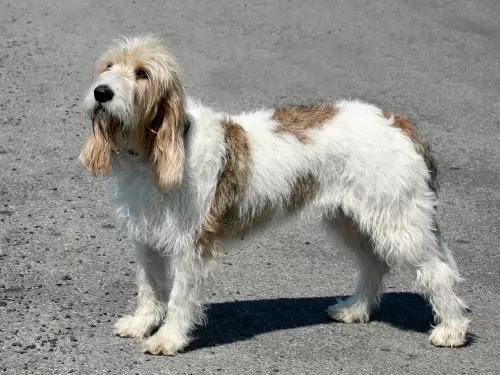 The Grand Basset Griffon Vendeen is a French scenthound that has changed over many centuries and today the area in France where they originate from, has contributed to the dog's looks.
The Grand Basset Griffon Vendeen is a French scenthound that has changed over many centuries and today the area in France where they originate from, has contributed to the dog's looks.
The rocky and thorny region of Vendeé required a hardy breed of dog. Also, hunters wanted a slower hound that they could keep up with, and the idea was to shorten the legs of the dog.
By the end of the 19th century, the Basset Griffon Vendéen was developed. By the 1950s, the Grand was considered a separate breed. and Petit was not banned until 1977.Today the dog is a long-backed and short-legged hunting dog.
The Cordoba fighting dog is a mixed breed. Bull Terrier, Mastiff and Bulldog make up this dog breed.
He was a large dog, standing at between 58 and 62cm and weighing between 32 to 55 kg. He was lean and muscled with a wide chest and small ears that were cropped. His powerful jaws were to be avoided as once they settled around another dog’s throat, the grip was vice-like. The dog’s coat was short and was essentially white with black marks on the body and around the head.
A Cordoba Fighting Dog is aggressive and strong. While most dogs benefit immensely from training and socialization, these dogs, even with training, remained somewhat aggressive, so they were no doubt not a good choice for first time dog owners, or for those with children in the home. Also the dog was always aggressive towards other dogs.
You could safely say that if these dogs were around today, they would not be looked upon as the ideal family pet.
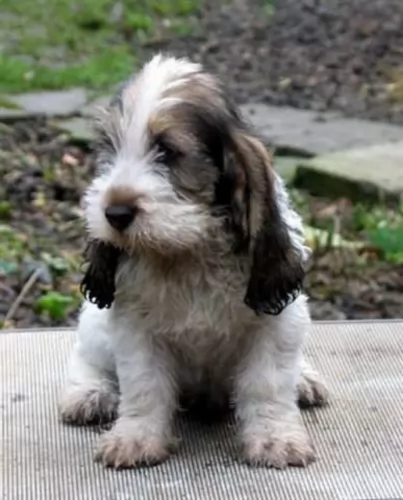 Kept today essentially as a domestic pet, the Grand Basset Griffon Vendéen is a strongly built dog, a rough-coated scent hound of medium size standing at roughly 39 to 45cm in height and weighing 18 to 20kg.
Kept today essentially as a domestic pet, the Grand Basset Griffon Vendéen is a strongly built dog, a rough-coated scent hound of medium size standing at roughly 39 to 45cm in height and weighing 18 to 20kg.
The coat is medium length, shaggy and wiry. It is essentially white with orange markings. Sometimes he can be tri-colored, having a combination orange, black or tan markings. The Grand Basset Griffon Vendeen’s coat is double with a thick, weather-resistant undercoat and a rough, harsh topcoat. In addition to regular brushing, this breed’s coat needs to be hand-stripped once a year.
His legs are straight, and he is longer than he is tall. He is a deep chested dog with long ears and a long tail. He is also noted for his mustache and beard with long eyebrows.
Your Grand Basset is a courageous, happy, confident dog, active and having great stamina.
He is a social, pack dog so he will be wanting plenty of time spent with his owner, failing which the owner should invest in another dog too. He will get on great with children and he is also a pet-friendly breed who will get on well with cats too. He is sharp and alert and responds well to training and socialization.
The Cordoba Fighting Dog was a hunter and also a fighting dog. It was a fierce, aggressive dog, and while he may have formed a bit of a bond with his owner, he wouldn’t have made a good family pet.
With an unstable temperament, who knows when he could have turned on his owner or the owner’s family? Certainly he wouldn’t have tolerated any other pets in the home.
Perhaps it is better if he has become extinct because dog fighting is abhorrent and hopefully being banned today, and he would never have been much good as a family pet.
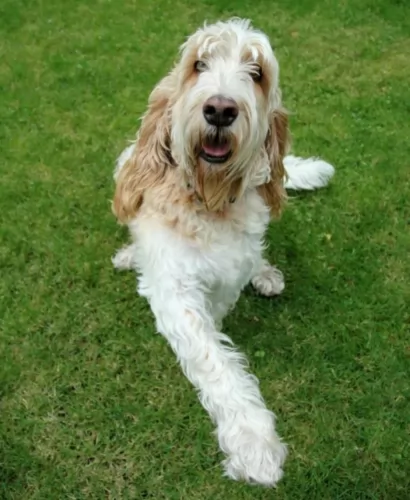 This long-backed, short legged hunting dog has a happy, confident personality.
This long-backed, short legged hunting dog has a happy, confident personality.
While he was used originally for hunting, he is now commonly kept as a companion dog. He is energetic and independent and will require you having him join you for walks and a ball game too.
Non-aggressive and adaptable he can live in the city or in the countryside so long as he receives plenty of attention and love – then he'll be a splendid pet.
The Cordoba Fighting Dog was a generally healthy breed but even so, its very lifestyle made it want to gobble down his food without much chewing. This possibly resulted in a number of problems such as bloat.
Bloat is a serious condition which the Cordoba had to deal with and which happens with modern day dogs too. It is an ailment not to be taken lightly. Your dog will need to get to the vet as soon as possible. The dog’s stomach fills with gas, which can also result in the stomach twisting.
When the stomach fills with gas, pressure is put on the diaphragm, making it difficult for the dog to breathe. The dog’s abdomen is swollen, he has difficulty with breathing and he will likely be drooling. It is an ailment which can happen to any breed of dog, regardless of age. Larger dog breeds, however are more prone to it.
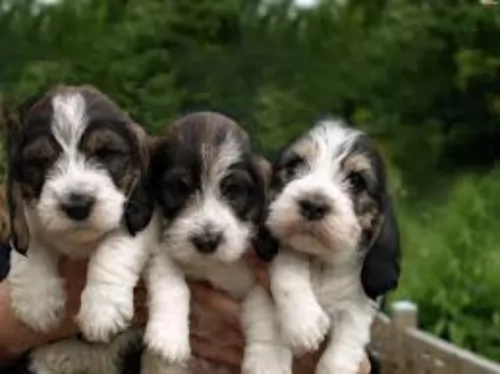 There are some Basset Griffon Vendéens that have reached 17 years of age. This is excellent for these dogs and lifestyle, nutrition and exercise can all play a part in the longevity of any dog.
There are some Basset Griffon Vendéens that have reached 17 years of age. This is excellent for these dogs and lifestyle, nutrition and exercise can all play a part in the longevity of any dog.
Generally they live to be 10 to 14 years of age. While he is a pretty robust dog, you'll want to be aware of some of the diseases which may require veterinary intervention -
Cancer is a major cause of death in elderly dogs, but if caught early, the dog can be cured. These cancers can be malignant lymphoma, skin cancer, bone cancer or soft tissue sarcomas. You'll notice a lump on your pet or a wound they won't heal. When you notice your dog not feeling well, get him to the vet.
A common form of heart disease in dogs is valvular disease, heartworm disease and myocardial disease. The signs of heart disease in your pet will depend on the severity of the disease and type. As heart disease moves on to congestive heart failure, you'll notice symptoms such as difficulty with breathing, fatigue, loss of appetite and weight loss. You need to get your dog immediately to the vet.
Dog allergies can be caused by pollen, medications, food or insects. You'll notice your pet scratching, he'll have watery eyes and inflamed skin. This inflammatory condition can cause a lot of agony for your pet, driving him mad with pain and the desire to scratch and lick. Relieve his discomfort by getting him to the vet as soon as possible.
The Cordoba Fighting Dog was a short haired dog and no doubt his owner would have given him a brush down every now and then to keep him looking presentable.
The Cordoba was used for fighting to the death with other dogs, so a strong dog like this will have required a high-protein diet. The owners particularly wouldn’t have wanted a dog with hip- and elbow dysplasia and they would have ensured a good choice of raw meat, cooked brown rice and vegetables.
Manufactured dog food started emerging about the mid-1800s and the dogs would have been fed this, made up of wheat meals, meat and vegetables which was then mixed with cooked meat and vegetables.
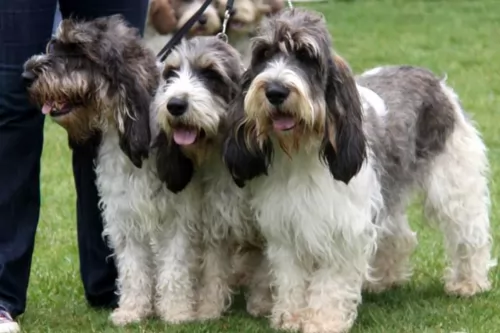 If you are going to be feeding your Grand Basset Griffon Vendéen kibble, there are excellent brands that bring out breed-specific formulas for age, size and energy levels of dogs.
If you are going to be feeding your Grand Basset Griffon Vendéen kibble, there are excellent brands that bring out breed-specific formulas for age, size and energy levels of dogs.
Feeding a dog is an individual choice, but good food can increase his longevity. A bit of raw meat mixed into his kibble, or some cooked brown rice, vegetables and chicken will be excellent for him. This can be a tasty variety to his diet.
Fresh, cool water must always be available at all times.
The Grand Basset Griffon Vendeen’s coat is double and the rough, harsh coat will need brushing twice a week and stripped once a year.